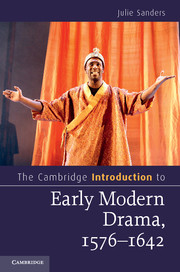Book contents
- Frontmatter
- Dedication
- Contents
- List of illustrations
- Preface: an outline of approaches taken
- Acknowledgements
- List of abbreviations and editions
- Introduction: Brick, lime, sand, plaster over lath and ‘new oaken boards’: the early modern playhouse
- Case study A Richard III at the Globe
- Case study B An outdoor theatre repertoire: the Rose on Bankside
- Chapter 1 Tragedy
- Case study C Opening scenes
- Case study D Staging violence and the space of the stage
- Chapter 2 Revenge drama
- Case study E ‘Here, in the Friars’: the second Blackfriars indoor playhouse
- Case study F The social life of things: skulls on the stage
- Chapter 3 Histories
- Case study G Title pages and plays in print
- Chapter 4 Comedy, pastoral and romantic
- Case study H The boy actor: body, costume and disguise
- Chapter 5 City comedies
- Case study I The dramaturgy of scenes
- Case study J Collaborative writing or the literary workshop
- Chapter 6 Satire
- Case study K Topical theatre and 1605–6: ‘Remember, remember the fifth of November’
- Case study L ‘Little eyases’: the children's companies and repertoire
- Chapter 7 Tragicomedy
- Case study M The visual rhetoric of dumb show
- Conclusion: The wind and the rain: the wider landscape of early modern performance
- Chronology
- Notes
- Bibliography
- Index
- Cambridge Introductions to . . .
Case study C - Opening scenes
Published online by Cambridge University Press: 05 June 2014
- Frontmatter
- Dedication
- Contents
- List of illustrations
- Preface: an outline of approaches taken
- Acknowledgements
- List of abbreviations and editions
- Introduction: Brick, lime, sand, plaster over lath and ‘new oaken boards’: the early modern playhouse
- Case study A Richard III at the Globe
- Case study B An outdoor theatre repertoire: the Rose on Bankside
- Chapter 1 Tragedy
- Case study C Opening scenes
- Case study D Staging violence and the space of the stage
- Chapter 2 Revenge drama
- Case study E ‘Here, in the Friars’: the second Blackfriars indoor playhouse
- Case study F The social life of things: skulls on the stage
- Chapter 3 Histories
- Case study G Title pages and plays in print
- Chapter 4 Comedy, pastoral and romantic
- Case study H The boy actor: body, costume and disguise
- Chapter 5 City comedies
- Case study I The dramaturgy of scenes
- Case study J Collaborative writing or the literary workshop
- Chapter 6 Satire
- Case study K Topical theatre and 1605–6: ‘Remember, remember the fifth of November’
- Case study L ‘Little eyases’: the children's companies and repertoire
- Chapter 7 Tragicomedy
- Case study M The visual rhetoric of dumb show
- Conclusion: The wind and the rain: the wider landscape of early modern performance
- Chronology
- Notes
- Bibliography
- Index
- Cambridge Introductions to . . .
Summary
Busie old foole, unruly Sunne,
Why dost thou thus . . .
I wonder by my troth, what thou, and I
Did till we lov’d?
For Godsake hold your tongue, and let me love . . .
The so-called ‘metaphysical’ poet John Donne is renowned for the vivacity and sheer affront of some of the opening lines of his poems, not least those in his Songs and Sonnets which were first published in 1633 but which were written and circulated in manuscript at the same time that Jonson and Shakespeare were writing some of their most successful commercial theatre plays. The above opening lines of the poems now known as ‘The Sunne Rising’, ‘The Good Morrow’ and ‘The Canonization’ could be openings to plays by Shakespeare and Jonson; they have the same confidence about beginning a scene in medias res, mid-conversation, as Shakespeare does in Othello for example, and with direct address. It is no coincidence that (before he became Dean of St Paul's at least) Donne was an avid theatregoer and that the influences of the dramatic form spread across his work, even (perhaps most) into the Holy Sonnets where Donne seems almost to be conducting a series of doubting and often angry soliloquies with himself and by extension with his only other audience, his God. Donne's daughter married the star actor Edward Alleyn, further cementing the opportunities for cross-fertilisation between theatre, poetry and the pulpit in the early modern period.
- Type
- Chapter
- Information
- Publisher: Cambridge University PressPrint publication year: 2014



